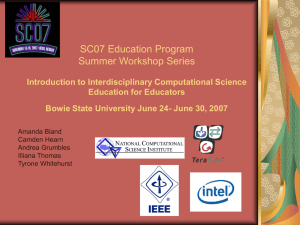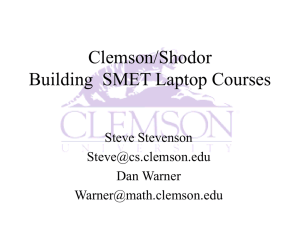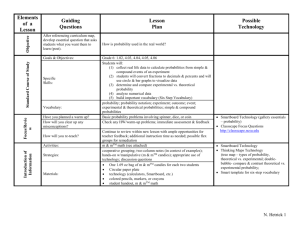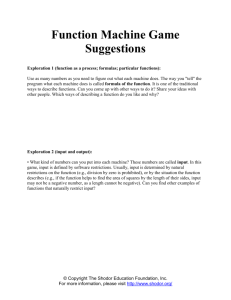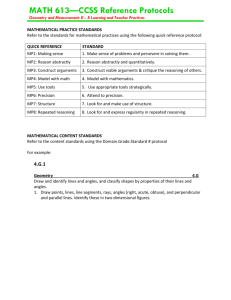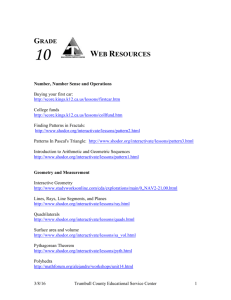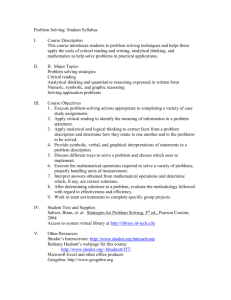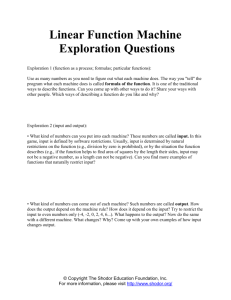Student Learning Centers in the Math Classroom
advertisement
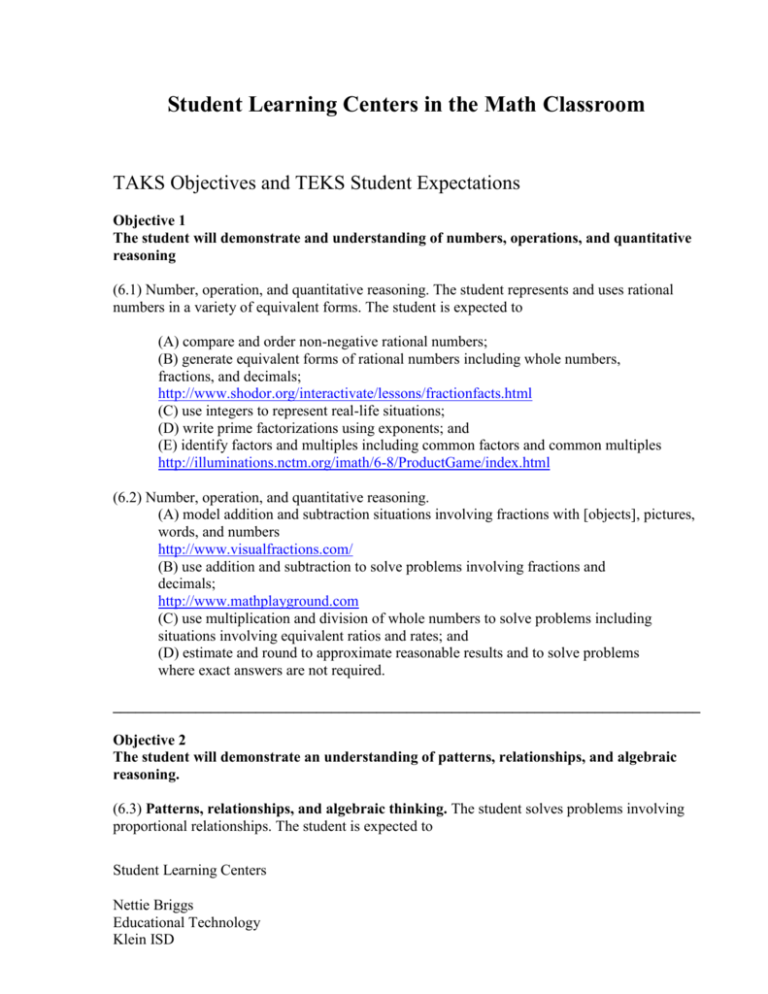
Student Learning Centers in the Math Classroom TAKS Objectives and TEKS Student Expectations Objective 1 The student will demonstrate and understanding of numbers, operations, and quantitative reasoning (6.1) Number, operation, and quantitative reasoning. The student represents and uses rational numbers in a variety of equivalent forms. The student is expected to (A) compare and order non-negative rational numbers; (B) generate equivalent forms of rational numbers including whole numbers, fractions, and decimals; http://www.shodor.org/interactivate/lessons/fractionfacts.html (C) use integers to represent real-life situations; (D) write prime factorizations using exponents; and (E) identify factors and multiples including common factors and common multiples http://illuminations.nctm.org/imath/6-8/ProductGame/index.html (6.2) Number, operation, and quantitative reasoning. (A) model addition and subtraction situations involving fractions with [objects], pictures, words, and numbers http://www.visualfractions.com/ (B) use addition and subtraction to solve problems involving fractions and decimals; http://www.mathplayground.com (C) use multiplication and division of whole numbers to solve problems including situations involving equivalent ratios and rates; and (D) estimate and round to approximate reasonable results and to solve problems where exact answers are not required. ______________________________________________________________________________ Objective 2 The student will demonstrate an understanding of patterns, relationships, and algebraic reasoning. (6.3) Patterns, relationships, and algebraic thinking. The student solves problems involving proportional relationships. The student is expected to Student Learning Centers Nettie Briggs Educational Technology Klein ISD (A) use ratios to describe proportional situations; (B) represent ratios and percents with [concrete] models, fractions, and decimals; and http://pbskids.org/cyberchase/games/percent/percent.html (C) use ratios to make predictions in proportional situations. http://www.mathplayground.com/ ______________________________________________________________________________ Objective 3 The student will demonstrate an understanding of geometry and spatial reasoning. (6.6) Geometry and spatial reasoning. The student uses geometric vocabulary to describe angles, polygons, and circles. The student is expected to (A) use angle measurements to classify angles as acute, obtuse, or right; (B) identify relationships involving angles in triangles and quadrilaterals; and (C) describe the relationship between radius, diameter, and circumference of a circle. (6.7) Geometry and spatial reasoning. The student uses coordinate geometry to identify location in two dimensions. The student is expected to (A) locate and name points on a coordinate plane using ordered pairs of nonnegative rational numbers. ______________________________________________________________________________ Objective 4 The student will demonstrate an understanding of the concepts and uses of measurement. (6.8) Measurement. The student solves application problems involving estimation and measurement of length, area, time, temperature, capacity, weight, and angles. The student is expected to (A) estimate measurements and evaluate reasonableness of results; http://pbskids.org/cyberchase/games/bodymath/bodymath.html http://www.shodor.org/interactivate/lessons/estimate.html (B) select and use appropriate units, tools, or formulas to measure and to solve problems involving length (including perimeter and circumference), area, time, temperature, capacity, and weight; http://www.shodor.org/interactivate/lessons/perim.html (C) measure angles; and http://pbskids.org/cyberchase/games/anglemeasurement/anglemeasurement.html http://www.shodor.org/interactivate/lessons/angles.html (D) convert measures within the same measurement system (customary and metric) based on relationships between units. Student Learning Centers Nettie Briggs Educational Technology Klein ISD ______________________________________________________________________________ Objective 5 The student will demonstrate an understanding of probability and statistics. (6.9) Probability and statistics. The student uses experimental and theoretical probability to make predictions. The student is expected to (A) construct sample spaces using lists, tree diagrams, and combinations; and (B) find the probabilities of a simple event and its complement and describe the relationship between the two. http://www.shodor.org/interactivate/lessons/pm7.html (6.10) Probability and statistics. The student uses statistical representations to analyze data. The student is expected to (A) [draw and] compare different graphical representations of the same data; (B) use median, mode, and range to describe data; (C) sketch circle graphs to display data; and (D) solve problems by collecting, organizing, displaying, and interpreting data. http://www.2020tech.com/fruit/index.html ______________________________________________________________________________ Additional Online Resources TexasTMDS http://www.accesstmds.com NCTM Illuminations Selected Web Resources http://illuminations.nctm.org/swr/index.html Lessons with online manipulatives arranged according to the NCTM Principles and Standards for School Mathematics and the NCEE Performance Standards for Middle School http://www.shodor.org/interactivate/lessons/index.html SailOn: http://www.pasadenaisd.org/SailOn/default.htm Interactive web resources organized by grade and subject level TEKS Ask Dr. Math: a question and answer service for math students and their teachers http://mathforum.org/dr.math/ TALON: a database of K–12 resources and Internet sites from the SouthCentral Regional Technology in Education Consortium Student Learning Centers Nettie Briggs Educational Technology Klein ISD http://www.southcentralrtec.org/talon/subjects/math.html National Library of Virtual Manipulatives http://matti.usu.edu/nlvm/nav/index.html Student Learning Centers Nettie Briggs Educational Technology Klein ISD
